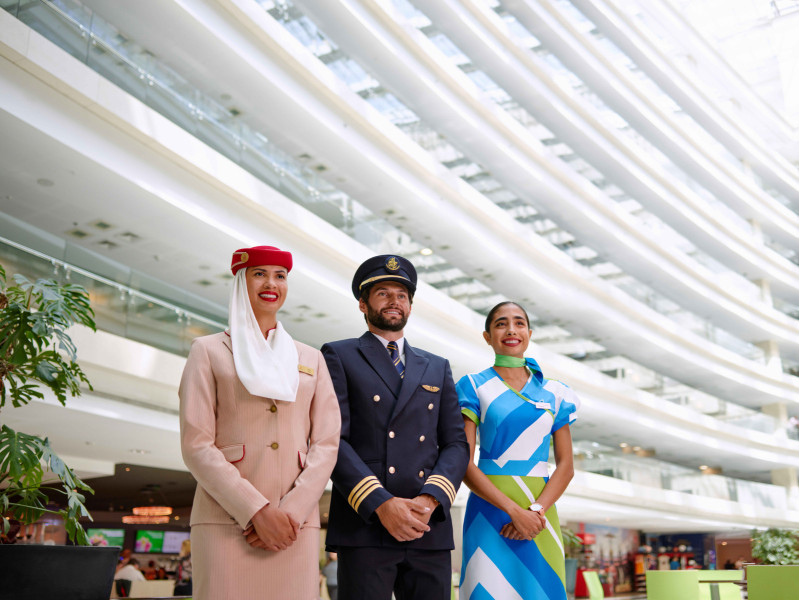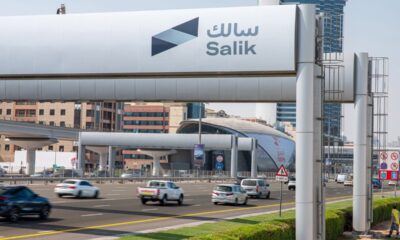The Emirates Group today released its 2023-24 Annual Report, hitting new record profit, revenue, and cash balance levels.
Both Emirates and dnata saw significant profit and revenue increases in 2023-24, as the Group expanded its operations around the world to meet strong customer demand for its high-quality products and services.
For the financial year ended 31 March 2024, the Emirates Group posted a record profit of AED 18.7 billion (US$ 5.1 billion), up 71% compared with an AED 10.9 billion (US$ 3.0 billion) profit for last year. The Group’s revenue was AED 137.3 billion (US$ 37.4 billion), an increase of 15% over last year’s results. The Group’s cash balance was AED 47.1 billion (US$ 12.8 billion), the highest ever reported, up 11% from last year.
Combined Group profits for the last 2 years, at AED 29.6 billion, surpass pandemic losses of AED 25.9 billion during 2020-2022.
His Highness Sheikh Ahmed bin Saeed Al Maktoum, Chairman and Chief Executive, Emirates airline and Group said: “The Emirates Group has once again raised the bar to deliver a new record performance. Throughout the year, we saw high demand for air transport and travel related services around the world, and because we were able to move quickly to deliver what customers want, we achieved tremendous results. We are reaping the benefit of years of non-stop investments in our products and services, in building strong partnerships, and in the capabilities of our talented people.
“Huge credit is also due to the UAE’s visionary leaders, especially HH Sheikh Mohammed bin Rashid Al Maktoum, Vice President and Prime Minister of the UAE and Ruler of Dubai. It is thanks to their leadership and the nation’s progressive policies that the Emirates Group is able to flourish. Both Emirates and dnata have forged successful business models leveraging Dubai’s unique advantages, in turn generating enormous value for Dubai and the communities they serve around the world.”
HH Sheikh Ahmed added: “The Group’s excellent financial standing today places us in a strong position for future growth and success. It enables us to invest to deliver even better products, services, and more value to our customers and stakeholders.”
Many major projects are already underway, including: a multibillion-dollar aircraft fleet and cabin renewal programme; new catering, cargo, and ground handling capabilities; advanced technologies to support the Group’s operations; expanded training and people development programmes; and initiatives to progress the Group’s sustainability agenda.
In 2023-24, the Group collectively invested AED 8.8 billion (US$ 2.4 billion) in new aircraft, facilities, equipment, companies, and the latest technologies to support its growth plans.
The Group’s total workforce grew by 10% to 112,406 employees, its largest size ever, as Emirates and dnata continued recruitment activity around the world to support its expanding operations and bolster its future capabilities.
The Group took significant strides in its sustainability journey during 2023-24, putting into action numerous initiatives focussed on the environment, its people, customers, and communities.
Environmental topics were high on the agenda during the year, as the UAE hosted the world’s biggest conference for climate action, COP28, in Dubai.
In 2023-24, Emirates signed new supply agreements to uplift sustainable aviation fuel (SAF) at its Dubai hub for the very first time, and also in Amsterdam and Singapore. The airline operated the first A380 demonstration flight using 100% SAF in one engine, collecting data to support industry efforts to enable a future of 100% SAF flying.
Recognising that airlines today have the limited viable solutions to meaningfully reduce carbon emissions, Emirates established a US$ 200 million fund to support R&D projects that focus on reducing the impact of fossil fuels in commercial aviation. It also became a founding entity of Air-CRAFT, a UAE-based research consortium for renewable and advanced aviation fuels; and joined The Solent Cluster, a UK initiative focused on producing low-carbon fuels for a variety of sectors, including aviation.
dnata continued to invest and induct more electric and hybrid vehicles to its global fleet of ground support equipment (GSE), adding new baggage tractors, cargo loaders, and pushback tractors to its USA operations. It also converted and refurbished diesel-powered GSEs in Italy to run on Hydrogenated Vegetable Oil and electric power. dnata’s UAE businesses including dnata logistics, Arabian Adventures, Alpha Flight Services and City Sightseeing Worldwide, transitioned to biofuel for its landside fleet of vehicles.
During the year, dnata became the first combined air services provider to receive the International Air Transport Association’s environmental management (IEnvA) certification for its commitment to sustainability across its UAE businesses; and Emirates achieved IEnvA Stage One and the IEnvA Illegal Wildlife Trade module certifications, for its efforts in environmental stewardship and anti-wildlife trafficking.
The Group ramped up investments in people development, rolling out a comprehensive programme of learning and training options for its workforce in partnership with top universities and key industry partners. A Gender Balance Council was established to champion and promote gender equality within the Group.
The Emirates Group has expanded its ESG reporting in its latest 2023-24 report and are adopting aspects of the GRI standards. It plans to evolve its reporting to meet ISSB and CSRD requirements in the coming years[1].
Sheikh Ahmed said: “We enter our 2024-25 financial year on strong foundations for continued growth. Emirates will receive delivery of 10 new A350 aircraft in 2024-25, adding to our fleet mix and supporting the next phase of its network growth. dnata will continue to leverage synergies and scale across its business divisions to grow its footprint and capabilities. In tandem, we are investing resources to minimise our environmental impact, develop our people, look after our customers and the communities we serve.”
“The business outlook is positive, and we expect customer demand for air transport and travel to remain strong in the coming months. As always, we will keep a close watch on costs and external factors such as oil prices, currency fluctuations, and volatile environments caused by socio-political changes. Our business model has been tested before, and I am confident in our resilience and ability to respond quickly to opportunities and challenges.”
He added: “Looking further ahead, the Dubai government has announced plans to start the next phase of expansion at Al Maktoum International Airport, which will eventually be the new hub for Emirates and dnata’s operations. This AED 128 billion (US$ 35 billion) investment will significantly expand and enhance Dubai’s aviation and logistics infrastructure, supporting the city’s growth, and Emirates’ and dnata’s growth.


























